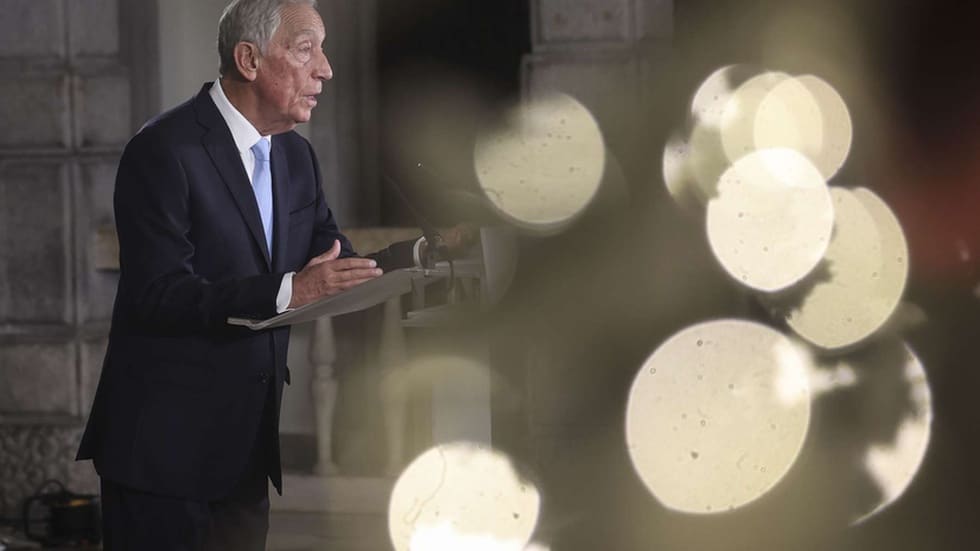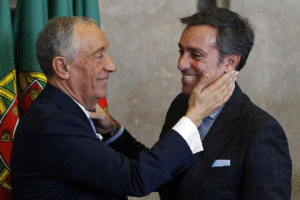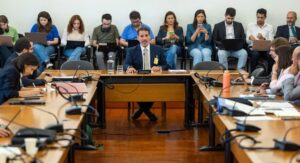Marcelo believes Portugal needs to stay ‘predictable’, ‘stable’
In what was the penultimate New Year address of his final mandate – and certainly the last one that will carry any political relevance – President Marcelo called for “common sense” and “institutional solidarity”.
Over the course of eight minutes, the country’s head of state sketched out the path he believes Portugal (ie the current government, backed by opposition parties) must follow. According to political analyst Ricardo Costa this involves repeating ‘a recipe from 2024’ – trying to show the country’s two main parties (PS Socialists and PSD social democrats) that “if they do not know how to tackle the issues of inequality, reform of the political system and economic growth, then they themselves are at stake”.
In short, in the opinion of SIC’s director of information, for Portugal to have a chance of growth, the perception that it is a predictable, stable country must prevail (in other words, Marcelo was giving a veiled warning to the opposition about any plans they may have to try and topple the minority centre-right government).
Going into more detail, Marcelo touched a bit on everything: he stressed that Europe this year must “do everything for the alliance with the United States of America”, at the same time staying united and not neglecting (other) allies.
“The challenges facing the European Union are to first do everything possible to build an alliance with the United States of America, but not to rely solely or mainly on that. To remain united, not to let alliances and allies fall, to prepare for a complex situation in the East, to gain its own military strength, to recover economically, to correct the delay in investment, knowledge and expertise, in which it has lost points with the United States of America and Asia, and finally to reform its fragile economic, political and social systems”, he said.
“It is all difficult, but all essential for the European Union to assert itself as a global power in the world”, Marcelo insisted, stressing that what happened in 2024 will “determine much of what the year that began (yesterday) will be like”.
“In the world, (2024) showed that the two main wars were continuing and worsening, and that economic recovery was weak, despite falling prices and interest rates. In Europe, the June elections provided a momentary relief for certain leaders and parties in power, but it was very short-lived, because strong economies continued to decline and governments in those economies were either already falling or continuing their slow decline.
“At the end of the year, the US elections took us back to 2016, allowing the winner to decide on the peace they want, in Ukraine and in the Middle East (…) A just, lasting peace, respectful of international law and humanitarian law, and therefore of people’s dignity? Or an unjust, precarious peace, ignoring the rights and respect for people and their humanitarian situation?”
Marcelo considered that incoming US President, Donald Trump, will have to “choose between wanting to collaborate with the European Union or wanting to distance himself from it, with the Russian Federation and China gaining more or less, according to the American positions. A greater alliance between the United States of America and the European Union in the economy, in politics, in Ukraine, in the Middle East, is better for Europe and worse for the Russian Federation and China, less alliance is better for the Russian Federation and China.”
As in many of Marcelo’s speeches, he warned of the folly of believing that democracy is a given. He also referred to the perennial 20% of the country struggling with poverty, stressing it is a structural problem that democracy this far has been unable to fix; adding that the importance of improving education and health in this country, along with housing, are necessities.
In the eyes of Ricardo Costa, it wasn’t “a very strong” address, but it was clear.
In the opinion of politicians in opposition it fell short. PS leader Pedro Nuno Santos returned to his party’s ‘lack of confidence in the competence of the government to face and resolve the challenges’ ahead (in spite of these challenges having been inherited from eight years of governments run by PS Socialists); CHEGA leader André Ventura criticised the ‘lack of criticism’ of the government: the speech “did not live up to our expectations”; PCP communists returned to the State Budget and how it ‘cannot hope to meet any of the objectives outlined by the president’; Bloco de Esquerda pointed out the lack of mention of the SNS state health service (which the media has been following through Christmas, cataloguing every failing), while Iniciativa Liberal commented that the “word and expression missing” from the speech was “reform of the state”.
Marcelo’s first five-year mandate started on a high in 2016, and when the second stretch finally comes to an end in January next year, there will be little, if anything, of that spirit remaining. Even Marcelo himself has said he will not miss the job in any way at all. Indeed, he plans to dedicate the future to schools – the compulsory years between six and 18 – as he believes “there are lots of things to do in which I can be useful”. And he insists he will never again discuss on politics, “no television, no radio, no newspapers, none of that…”


























